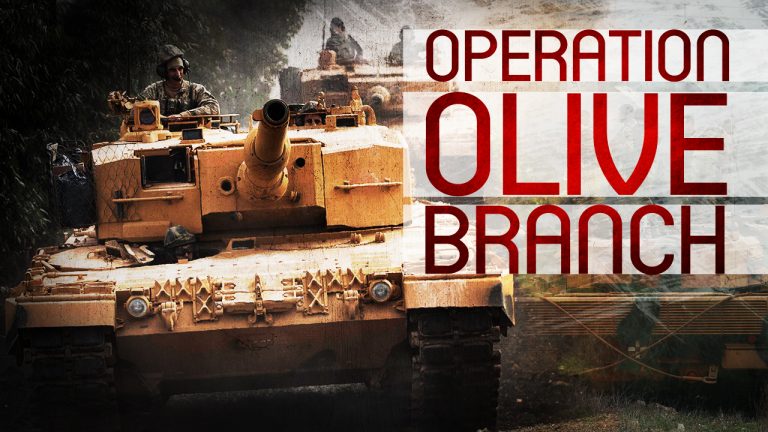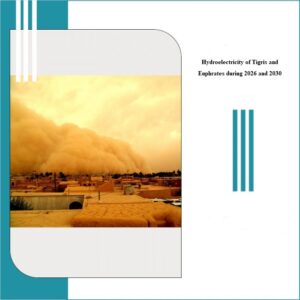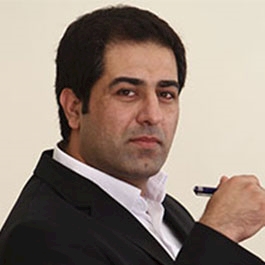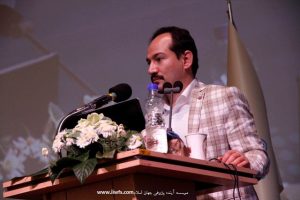Iranian Considerations against “Operation Olive Branch”
Mahdieh Madan-Nezhad
Research fellow at IIWFS
The start of the Turkish military operation, called the “Olive Branch” in the Afrin area, not only added to the complexity of the Syrian developments, but also exposed the difficulty of political choices of active actors in the crisis. According to the developments in the north of Syria, America’s difficulty in balancing its relationship with a NATO member (Turkey) and its indigenous partners in the fight against ISIS (the so-called Syrian-Democratic forces of Kurds and Arabs) is mentioned; but the fact is that recent Ankara military movements in northwest Syria have challenged Iran as an active actor in this crisis.
Last week, Tehran hosted the Turkish foreign minister, and during this meeting, opposition to the operation of Afrin and demand from Ankara to stop it was reflected in the media as the official position of Iran. The Iranian Foreign Ministry spokesman, at a press conference ahead of the visit to Iran by Mevlüt Çavuşoğlu, explicitly emphasized that the Turkish operation in Afrin should be stopped. Also, during a press conference, the Iranian president stated that Iran demands that Turkish military action be ended on the territory of Syria. Given that preventing the connection of Cantonese controlled by the Syrian Kurds and preventing their access to the Mediterranean could also serve Iran’s interests, and also, Iran and Turkey have made significant advances in reducing the tensions in Syria through threshold talks, in this note, we raise the question of why, despite the sharing of interests, Tehran is in opposition to the Turkish operation in Afrin.
Iran faces three main actors in the northern Syrian developments, including Turkey, the United States and Kurdish forces, which must take into consideration all three actors. The first considerations are in relation to Turkey, which it is possible to find Tehran’s opposition to Afrin’s operation for the following reasons:
The first cause should be sought in the basic principles of the Islamic Republic of Iran. Indeed, Iran, like the Damascus government, is opposed to Turkish military presence in Syria. Because Iran believes that military entry into a country requires the approval of its official government. However, Damascus did not agree with the operation of the “Euphrates Shield” and “Olive Branch” and it has always emphasized the need to withdraw these forces from the occupied corridor. Therefore, Iran’s opposition to the illegal entry into the territory of Syria without the permission of Turkish troops can be examined, with emphasis on the principle of preserving territorial integrity and national sovereignty.
The second reason can be attributed to Ankara’s position on Assad’s political future. However, since 2016, the representatives of the three countries, Iran, Turkey and Russia, had come across a table in several meetings with Syria to discuss and consult about the crisis, and even reached agreements (most notably the creation of a so-called “tension-reducing” area in four parts of Syria), but it should be noted that differences and beyond those, contradictions between the interests and objectives of the three countries are still in place. More precisely, though it seems that the threat of ISIS-related terrorist attacks on Turkish soil and the growing risk of forming an independent or self-governing Kurdish state on the southern borders of the country has made Ankara’s authorities and decision makers in a significant turn from the position of one of the main supporters of the overthrow of Bashar al-Assad to the joint Iran-Russia front against terrorism, Tehran-Moscow-Ankara Troika consultations and co-operation should not be seen as equal and convergent in their medium-term and long-term goals; Let’s not forget that Turkey is still committed to a political transition in which Assad will withdraw from power and not play a role in the Syrian political future.
Therefore, it can be said that since Ankara officials, in their official positions (even in the most recent positions), expressly emphasize that Assad does not have a role in the Syrian political future, and continue to support their supporters of the Damascus armed opposition, it is worrying that strengthening the field position of the Turkish-backed forces will strengthen their diplomatic position during the political transition, which, in turn, can pave the way to overthrowing Assad from power-that is, what could not be achieved in the battle.
The third reason can be seen from the doubts of Iran about the true objectives of Ankara from the operation of the Olive Branch. Although Turkey officially announces that in the field, the goal is Afrin, and the operation will extend to Manbij if the forces of People’s Protection Units (YPG) do not withdraw from this city, Tehran is also concerned about the true goals of Ankara from the operation of the Olive Branch. First of all (as noted in the second point), Iran believes that Erdogan’s ambitions in Syria are not limited to the northern parts of the country, but Ankara remains committed to changing the political regime in Damascus and will not thwart any action to achieve it. In addition, in relation to the olive branch, there are the same concerns that existed in the operation of the Euphrates shield. At that time, it was thought that with the domination of the Turkish forces and the Syrian opponents under their protection of the city of Al Baba, Ankara and its allies dominated the Aleppo strategic city, and probably the next target could be Aleppo.
Therefore, another point of view of the Iranian side is that Ankara considers the city of Aleppo as an important point that the domination of Afrin actually makes it one step closer to dominating the city. A noteworthy point is that the Kurdish forces agree with Tehran on Ankara’s intended purpose. Sipan Hamo, the commander of YPG forces, told Asharq al-Awsat newspaper that Turkey wants to dominate the Afrin region and the East and West of Aleppo to reach Aleppo, because Erdogan has always demanded the addition of Aleppo.
In addition to Turkey, in the developments in northern Syria, Iran is faced with another influential actor, the Kurdish forces, who also have considerations about them. While these forces officially announced the formation of a federal government in northern Syria, Iran insists on maintaining territorial unity of Syria. Also, beyond domestic concerns, Tehran’s engagement with the Kurds should be considered within the framework of their relationship with the United States. In other words, Kurdish forces, along with the Arab forces, are considered the main partner of Washington in a land war against ISIS.
In some analyzes, it’s largely the case that the United States, using the Kurdish card, provides a way for its influence in the complex Syrian game. Meanwhile, Tehran is not only opposed to US military presence in northern Syria, but in light of Washington’s announcement that Assad will not play a role in the future of Syria, it seeks to threaten its ability to maneuver in the process of transition from civil war to the realistic ceasefire in the country; This is while the Kurds are allowing the American side to penetrate. At the same time, some believe that the Kurds will allow the United States to pursue one of its declared objectives of curbing Iran’s influence in Syria.
Therefore, if we look at the interactions between Iran and the Kurds from this angle, we can say that the limitation of Kurdish field practice means limiting the power of American influence. However, it should be noted that, firstly, in general, US troops were not present in Afrin, unlike the Russian forces, which were deployed in coordination with the Kurds. Secondly, the withdrawal of U.P.G forces from Afrin does not mean that these areas are controlled by the Syrian government or its allies, but the forces that Assad’s downfall is still their main goal, is to acquire a new land.
The third consideration of Iran can be seen in the bilateral relations between Ankara and Washington. Although what has been particularly striking in recent weeks in relations between Turkey and the United States could be seen as a gap between the United States and one of its major regional allies, the Iranian authorities seem to be aware that, in any case, the two countries are both NATO members who have linked their vast interests together. Therefore, despite the tensions and upheavals between Ankara and Washington, the separation of the two from each other or the direct confrontation is equally distant from the mind. Accordingly, Tehran’s decision-makers cannot close their eyes against Erdogan’s ambitions in the hope that The Turkish military’s advance will leave Ankara from the Washington-backed front and will bring it closer to the Iran-Russia joint front.
The difference between Iran and Turkey’s relations with the northern Syrian Kurds can be considered as the fourth observation. While the Turks see the U.P.G. forces as the military branch of the Democratic Union Party (PYD) and the Syrian branch of the Kurdistan Workers’ Party, Tehran’s relations with these forces have more complex dimensions. Despite security concerns about the activities of the PKK’s affiliates in Iran, the considerations of Syria’s field and political developments forced Iran to cooperate and even assist these forces, especially against ISIS’s progress.
However, the basic principles of Iran and its widespread stance towards Syria are not covered by anyone. What was also attempted to explain in this note is, in fact, the reason for Tehran’s official opposition to Turkish military action and the need to put an end to it. The author, however, knows the reasons for Iran’s opposition and concerns with Afrin’s operation more seriously than the decision-makers want to ignore. Of course, one cannot neglect the other side of coin, which implies several important questions that, despite Iran’s explicit objections to the operation of the Olive Branch, could it be done without Iran’s tacit consent? Is it possible to argue that the deal on Idlib was more profitable than it was to refuse of ignoring the entry to Afrin? Can we consider Tehran’s explicit opposition to oppose the operation merely as a warning to Turkey regarding non-compliance with the prospective commitments that allowed the start of the operation of the olive branch?
It should be noted that the author does not want to say that the opposition of Iran is not real, but for the reasons mentioned above, there are factors with a heavy weight for the opposition of Tehran. But the reality of the past seven years in Syria has shown that this crisis is more international than to be resolved by an actor or a single front. This makes active actors consider several considerations and prioritize them, or have to agree to a change that does not endanger their vital interests. However, behind the scenes of official Syrian news, there are realities that reveal it can take analysts to another direction; but here comes the confirmed news.
Considering the official position of Tehran, it seems that, despite the common interests of Iran and Turkey, it can be said that the above considerations about Ankara’s goals in the Afrin operation are more than of common Kurdish concern among the two countries. In spite of the fact that the Kurds, in rejecting the proposal of the Allied forces for the delivery of the government agencies of Afrin to Damascus, committed a strategic mistake and somehow ignored Tehran’s support for themselves against ISIS, Erdogan’s endless ambitions seem to have raised Iran’s concerns over the Afrin operation. While several reports and analyzes of Moscow’s agreement with Ankara for Operation Afrin or at least silence against it have been published, the official position of senior Iranian officials is to oppose it, which was dealt with in this note for its reasons.
** This article is originally published in Persian and translated by A.R. Mirjomehri.





